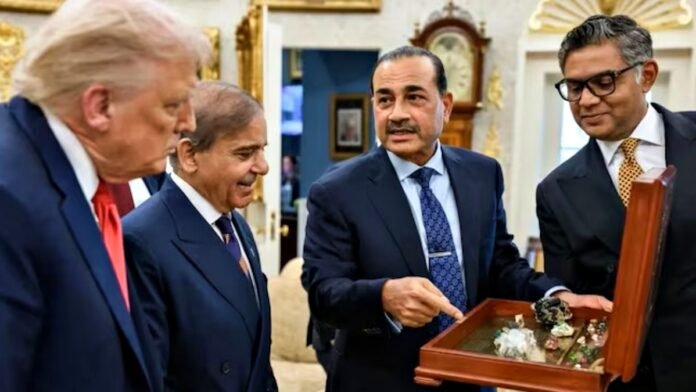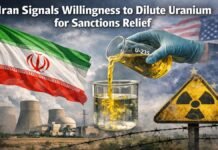
Key Points:
- Pakistan exports first shipment of rare earth minerals including neodymium, praseodymium, antimony, and copper concentrate to United States
- September 8 agreement signed between Rare Earth Minerals (USSM) and Pakistan’s Frontier Works Organization (FWO) in presence of PM Shahbaz Sharif and Army Chief Asim Munir
- Opposition party PTI demands public disclosure of deal terms, claims government bypassed parliamentary approval
- Pakistan’s mineral wealth estimated at $6 trillion, concentrated in Balochistan and Khyber Pakhtunkhwa provinces
- Reports suggest Pakistan offered Pasni Port in Balochistan’s Gwadar district for mineral export operations
New Delhi: Pakistan has taken a historic step in its economic diplomacy by dispatching its inaugural shipment of rare earth minerals to the United States, marking a significant shift in the country’s resource management strategy. However, this milestone achievement has ignited fierce domestic controversy over sovereignty concerns and transparency in government dealings.
Strategic Minerals Agreement Details
The landmark agreement was formalized on September 8 in Islamabad between the American firm United States Strategic Metals (USSM) and Pakistan’s Frontier Works Organization (FWO), a military-run engineering enterprise. The high-profile ceremony witnessed the presence of Prime Minister Shahbaz Sharif and Army Chief General Asim Munir, underscoring the strategic importance both nations attach to this partnership.
The comprehensive deal encompasses exploration, extraction, and export of critical minerals including antimony, copper, gold, tungsten, neodymium, and praseodymium. These rare earth elements are essential for modern technology manufacturing, including smartphones, electric vehicles, wind turbines, and advanced military systems. The agreement also includes provisions for establishing mining infrastructure and processing facilities within Pakistani territory, potentially creating thousands of jobs in mineral-rich regions.
Opposition Raises Parliamentary Concerns
Pakistan Tehreek-e-Insaf (PTI), the country’s main opposition party, has launched strong objections to the mineral export deal, alleging procedural irregularities and lack of legislative oversight. PTI leadership contends that the Shahbaz Sharif government finalized this strategically sensitive agreement without seeking parliamentary approval or conducting public consultation, raising questions about constitutional compliance.
PTI Press Secretary Sheikh Waqas Akram drew historical parallels to express concerns about potential long-term implications. He referenced Mughal Emperor Jahangir’s 1615 decision to grant British trading rights at Surat port, which eventually paved the way for colonial domination. Akram emphasized that Pakistan must learn from historical precedents and exercise extreme caution when granting foreign entities access to natural resources.
The opposition has formally demanded that the government release complete details of the agreement, including profit-sharing arrangements, mining duration, environmental safeguards, and provisions protecting Pakistan’s long-term interests.
Strategic Port Access and Infrastructure
Adding another dimension to this partnership, credible reports indicate that Pakistan has proposed allowing the United States access to Pasni Port in Balochistan’s Gwadar district. This coastal facility would serve as a critical logistics hub for expediting mineral exports to American markets, potentially reducing transportation costs and delivery timelines.
The Pasni Port offer carries geopolitical significance, particularly given the proximity to China’s Belt and Road Initiative project at Gwadar Port. This development could represent Pakistan’s effort to balance its strategic relationships between Washington and Beijing, though it may complicate the already sensitive regional dynamics.
High-Level Diplomatic Engagement
During their September meeting with US President Donald Trump in Washington, Prime Minister Shahbaz Sharif and Army Chief General Asim Munir presented a symbolic gift box containing samples of rare earth metals and precious stones from Pakistan. This gesture was designed to showcase Pakistan’s mineral wealth potential and demonstrate commitment to strengthening bilateral economic ties.
The meeting followed months of diplomatic groundwork aimed at repositioning Pakistan as a reliable partner in America’s critical minerals supply chain strategy, particularly as the United States seeks to reduce dependence on Chinese rare earth supplies.
Untapped Mineral Wealth and Economic Potential
Geological surveys and expert assessments estimate Pakistan’s total mineral reserves at approximately $6 trillion, representing one of the world’s largest untapped resource bases. The Balochistan and Khyber Pakhtunkhwa provinces contain particularly rich deposits of rare earth elements, copper, gold, and other strategically valuable minerals.
Despite this enormous potential, Pakistan has historically struggled to commercially exploit these resources due to security challenges, inadequate infrastructure, limited technological expertise, and absence of comprehensive mining policies. The USSM partnership represents Pakistan’s most ambitious attempt to monetize these assets through foreign investment and technical collaboration.
Economic Benefits and Job Creation Prospects
USSM has characterized this first mineral delivery as a “historic milestone” in Pakistan-US strategic cooperation, projecting significant economic benefits for Pakistan. The company anticipates that systematic mineral extraction and export operations will generate substantial foreign exchange earnings, create employment opportunities in underdeveloped regions, and stimulate ancillary industries including transportation, logistics, and manufacturing.
Government officials project that successful implementation could establish Pakistan as a major player in the global critical minerals market, potentially attracting additional foreign investment in the mining sector.
Security and Sovereignty Concerns
Beyond parliamentary procedure questions, security analysts have raised concerns about protecting mining operations in volatile regions like Balochistan, where separatist movements and militant groups operate. The involvement of FWO, a military organization, suggests authorities recognize these security challenges.
Critics also question whether Pakistan possesses adequate regulatory frameworks to ensure environmental protection, fair revenue distribution to local communities, and prevention of resource exploitation. The lack of publicly available agreement terms has fueled speculation about potentially unfavorable conditions that could compromise Pakistan’s long-term interests.
Regional Geopolitical Implications
This Pakistan-US minerals partnership occurs against the backdrop of intensifying global competition for rare earth resources. China currently dominates rare earth production and processing, controlling approximately 70 percent of global supply. The United States and allied nations are actively pursuing alternative supply sources to reduce strategic vulnerability.
Pakistan’s decision to align with American mineral procurement efforts could strain its relationship with China, its closest ally and largest investor through the China-Pakistan Economic Corridor (CPEC). Beijing may view Pasni Port access for the United States as a strategic setback in a region where it has invested billions.
Path Forward and Transparency Demands
As domestic debate intensifies, pressure is mounting on the Shahbaz Sharif government to address transparency concerns and demonstrate that the agreement serves Pakistan’s national interests. Parliamentary committees may demand detailed briefings on contract terms, revenue projections, environmental impact assessments, and provisions safeguarding Pakistani sovereignty.
The success or failure of this pioneering minerals export initiative will likely influence Pakistan’s broader resource development strategy and foreign investment policies for years to come, making governmental accountability and public trust essential components of sustainable progress.



















































